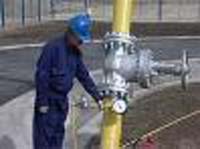EU and U.S. must to secure energy supply together
Europe and the United States need to work together more closely to guarantee energy supplies, EU Commission President Jose Manuel Barroso said Thursday. "In today's world, if the energy security of either one of us is impaired, it affects the other," Barroso said in remarks prepared for a speech at Georgetown University in Washington. "It would fly in the face of common sense for the trans-Atlantic partnership to pull in different directions in this critical area."

Last year's sudden oil price hike highlighted how rapidly growing economies such as India and China are competing for limited supplies of oil on the world market. Barroso and U.S. President George W. Bush seem to be on the same page when it comes to both region's addiction to imported oil.
"Europe is becoming ever more dependent on oil and gas imports from geopolitically uncertain regions," Barroso said. Bush described America as addicted to oil often imported from unstable parts of the world in his State of the Union address last month. The U.S. imports nearly 60 percent of its oil and refined products, more than 12 million barrels a day. About one-fifth of the oil comes from the Persian Gulf, much of it from Saudi Arabia.
Barroso said Europe already imports 50 percent of its energy needs, making it the world's largest importer and second-largest consumer of energy. The situation is worsening the European Commission expects that the EU will import 70 percent of its energy by 2030 unless it cuts demand and develops alternative supplies at home.
EU energy demand is forecast to rise by 1 percent to 2 percent a year with fossil fuel use rising to almost 90 percent of the total energy supply. "We have to do something about this, and we have to do it now," Barroso said. "The world has entered a new energy era. We can no longer take secure and affordable supplies for granted."
Recent events had focused minds, he said. Russia's surprise move to turn off gas supplies to Europe on New Year's Day, aimed at threatening neighboring Ukraine, shocked major gas importers such as Germany and Italy, reopening a debate about alternative forms of energy from renewable to nuclear power.
European leaders are slated to discuss a radical change to the way they deal with energy at a summit next month. Barroso said it was "ridiculous" for the EU to have 25 separate energy policies as it has at the moment.
He claimed there was broad support across Europe for a single energy policy but some differences are emerging. France, which generates three quarters of its electricity from nuclear power, is a strong advocate of atomic power as an "emission-free" source of energy. Twelve EU countries do not use nuclear power at all, while others such as Germany and Sweden are determined to shut down old nuclear power plants, reports the AP.
N.U.
Subscribe to Pravda.Ru Telegram channel, Facebook, RSS!


